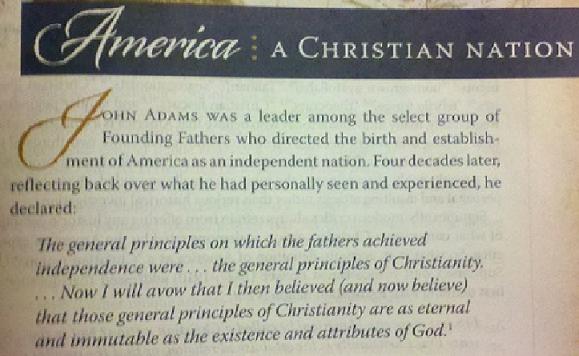I watched the whole thing because I study this stuff, but John Fea did his readers a favor by summarizing a truly bizarre segment of the Jim Bakker Show (and that is saying something) with David Barton and Brad Cummings as guests. You should go read it.
I really can’t improve on Fea’s piece, but I want to highlight a few things. It is being reported around social media that David Barton predicted that a second civil war might happen if the Supreme Court overturns Roe v. Wade. Barton believes “liberal states” like California will secede. He believes that might trigger a war.
First, I seriously doubt this prophecy. If Roe v. Wade is overturned, abortion regulation will return to the states and California will keep it legal while Alabama will outlaw it — at least for now. I believe there will be strong feelings and some might call for drastic actions, but I believe a return of regulation to the states has been anticipated for many years by both sides of the issue.
The second thing I want to notice here is the crew which cooked up this religious stew. According to Barton and Cummings (co-publisher of The Shack), they got together with Mormon Glenn Beck, seven mountain dominionist Lance Wallnau, and Rick Joyner to discuss where America is heading. I wonder which person’s god gave Joyner “the dream.”
Cummings then said that Joyner had a dream of America’s timeline from heaven’s perspective (because of course America is central in God’s mind). The bottom line is that Joyner said the time line ended with a second American civil war which this time will be “successful” in achieving equality. Let me quote what Fea had to say about this segment of the video:
Barton then affirms Joyner’s vision, and in doing so he says some accurate things about the failure of the founders to deliver on matters of racial equality. This is a huge step for Barton. It led me to wonder where he was going this. Where was the culture-war hook?
And then it happened. At about the 4:50 mark Barton adds an additional layer to his interpretation of Joyner’s dream. Rather than continuing with his mini-lecture on America’s failure in matters of race, he suggests that Joyner’s vision about a “Second American Revolution and Civil War” was actually about Roe v. Wade. Barton says that we should expect a Civil War “over the abortion issue.” If Roe v. Wade is overturned, California and other pro-choice states will secede from the Union and it will end in violence.
Eating this gnostic stew could be dangerous. Barton said he had to be careful how he said it, but there is no careful way to say that it may be God’s will to go to war over abortion. This is lunacy and every sane person should reject it publicly.
As I noted above, the issue will be decided by the states if Roe is overturned. However, even if states do attempt to secede, it is unthinkable to have a war where people die for a pro-life cause.
These people are so far removed from war that they don’t know what they are doing or who they are radicalizing. To them (especially Bakker and his end time food buckets), these sensationalized shows are ways to move products. Cummings and Barton are making the rounds right now to sell The Founders Bible as if it is a new thing. Rather, Barton and Cummings brought that out in 2012 after the failure of The Jefferson Lies.
About That Founders Bible
Barton and Cummings should do some soul searching on their messaging regarding slavery. In the first edition of The Founders Bible, they called slave holder and slavery advocate James Hammond of SC an American leader because he was an advocate of America as a Christian nation (see also here and here). Hammond was just alright then.
For more on historical errors in The Founders Bible, click here.
